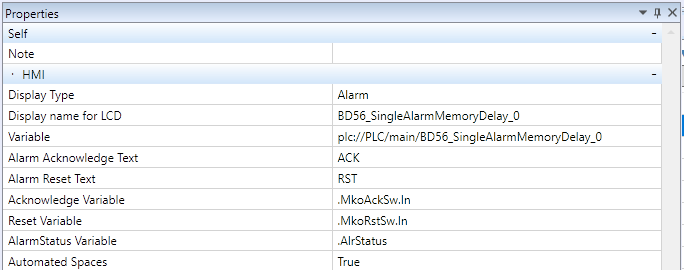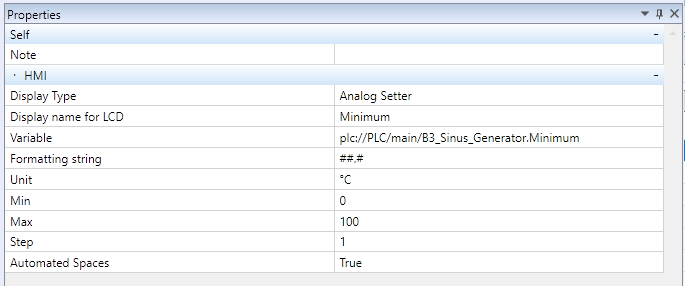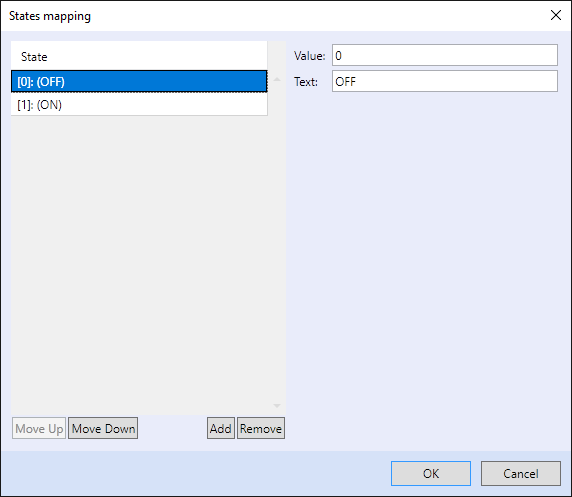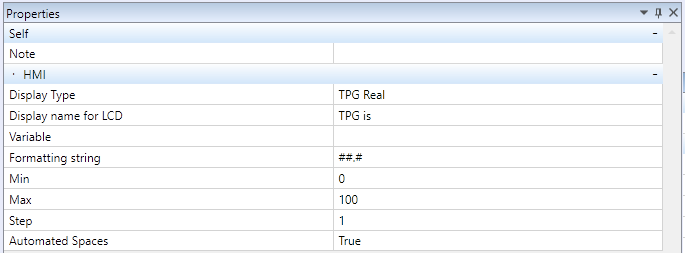Table of Contents
HMI text editor objects
Menu item types
Alarm
Indicator of alarm states. The object displays status of an alarm block, and alarm can be acknowledged or reset here according to its state - see table below. An alarm block has five possible states:
| State | Display indication | Description | Possible actions | alr_status variable value |
|---|---|---|---|---|
| Normal | OK | Normal state, no alarm | - | 0 |
| Alarm active | * | Active unacknowledged alarm | Acknowledge | 1280 |
| Active acknowledged | * + tick | Alarm acknowledged, still active | - | 1792 |
| Memory, acknowledged | -x | Acknowledged, inactive | Reset | 1536 |
| Memory, unacknowledged | - | Inactive, unacknowledged | Reset | 1024 |
To keep full functionality, the object must be linked with blocks “Lib.Core.V1_1.BD56_SingleAlarmMemoryDelay” or “Lib.Core.V1_1.BD57_AlarmMemoryExt”, variable alr_status
The “Alarm status” object properties are:
- Display type -object type (use Alarm for displaying of the alarm status)
- Display name for LCD - Text to be displayed on the terminal, followed by the actual alarm status text
- Variable - Path to the variable which contains the alarm status ( .AlrStatus by default)
- Alarm Acknowledge Text - Text to be displayed as a hint for alarm acknowledgement
- Alarm Reset Text - Text to be displayed as a hint for alarm reset
- Acknowledge Variable - Path to variable which is used to acknowledge alarm ( .MkoAckSw.In by default)
- Reset Variable - Path to variable which is used to reset alarm (.MkoRstSw.In by default)
- Alarm Status Variable - Path to variable which is used to read and write alarm status ( .AlrStatus by default)
Automated spaces - Adds a spaces between “Display Type” and other text properties (string format, unit, states…).
Analog Indicator
Display of analogue value.
The “Analog Indicator” object properties are:
- Display type - object type (Analog Indicator)
- Display name for LCD - Text to be displayed on the terminal, followed by value and units
- Variable - Path to the variable attached to the object
- Formatting string - Definition of the format of displayed value, the “#” characters represent positions related to the decimal point. If the number has more decimal spaces than set in formatting string, the value will be rounded. Zeros are not displayed instead of missing numbers infront of the decimal point. If the formatting string is set as “###,##” and the number is 99,12345, the result will be 99,12.
- Unit - Physical unit of the displayed value, will be displayed after the value
Analog Setter
Object to set analog value.
The “Analog Setter” object properties are:
- Display type - object type (Analog Setter)
- Display name for LCD - Text to be displayed on the terminal, followed by value and units
- Variable - Path to the variable attached to the object
- Formatting string - Definition of the format of displayed value, the “#” characters represent positions related to the decimal point. If the number has more decimal spaces than set in formatting string, the value will be rounded. Zeros are not displayed instead of missing numbers in front of the decimal point. If the formatting string is set as “###,##” and the number is 99,12345, the result will be 99,12.
- Unit - Physical unit of the displayed value, will be displayed after the value
- Min - Minimum value which can be set using Analog Setter
- Max - Maximum value which can be set using Analog Setter
- Step - Decrement or increment on clicking of the - or + button
Digital Indicator
Displays a predefined text according to a discrete numerical value.
The “Digital Indicator” object properties are:
- Display type - object type (Digital Indicator)
- Display name for LCD - Text to be displayed on the terminal, followed by a text from the Collection
- Variable - Path to the variable attached to the object
- States mapping - Editor which edits integer values and corresponding texts of the states
States mapping
In States mapping the states corresponding to variable values are mapped. The values are Integer or “True(1)/False(0)”. The longest text is taken for the preview and other calculations.
Digital Setter
Sets a predefined discrete numerical value according to a selected state text from the collection.
The “Digital Setter” object properties are:
- Display type - object type (Digital Setter)
- Display name for LCD - Text to be displayed on the terminal, followed by a text from the Collection
- Variable - Path to the variable attached to the object
- States mapping - Editor which edits integer values and corresponding texts of the states
States mapping
In States mapping the states corresponding to variable values are mapped. The values are Integer or “True(1)/False(0)”. The longest text is taken for the preview and other calculations.
HMI Template
The “HMI Template” object inserts a predefined template into a text menu. If this is a PLC menu, it is possible to insert a HMI program template or function block template. If this is a terminal menu, it is possible to insert a HMI program template or function block template, or a complete PLC template. See more on general HMI templates in the Full mode help.
The “HMI Template” object properties are:
- Display type - object type (HMI Template)
- Display name for LCD - Text to be displayed on the LCD
- Variable - Path to the function block / program / PLC which is attached to the object
- HMI Template - Selected HMI template for the function block / program / PLC
Login
The “Login” item creates a locked branch in the LCD menu. The password is a 4-digit PIN. If the unlocked path is left, it locks automatically after Timeout expires.
The “Login” object properties are:
- Display type - object type (Login)
- Display name for LCD - Text to be displayed on the LCD
- PIN - A fixed 4-digit code to allow entering the locked menu branch
- Timeout - if the unlocked branch is left, it locks again automatically after “Timeout” expires
Static Text
Displays a fixed text. It is used mostly in the main screen (site name), naming of menu branches (Setpoints, Heating, AHUs, Lights, etc.), or to create a submenu with supplier/service contact data (such as web pages and phone number).
The “Static Text” object properties are:
- Display type - object type (Static Text)
- Display name for LCD - Text to be displayed on the LCD
System DateTime
The “System DateTime” displays the local PLC date and time. Editing can be enabled in the object properties.
The “System DateTime” object properties are:
- Display type - object type (System DateTime)
A similar object, System Date Time Setter, is used to set the PLC date and time over the terminal.
TPG Bool
The “TPG Bool” object displays and edits a “Lib.Hvac.V1_0.T17_Boolean_Scheduler” or “Lib.Hvac.V1_0.T17_Boolean_Scheduler_Base” block.
The “TPG Bool” object properties are:
- Display type - object type (TPG Bool)
- Display name for LCD - Text to be displayed on the LCD, before the time program actual value
- Variable - Attached variable. For a “TPG Bool” object attach a “Lib.Hvac.V1_0.T17_Boolean_Scheduler” block, or “Lib.Hvac.V1_0.T17_Boolean_Scheduler_Base” block.
- True Text - Text to be displayed of the TPG output is “True” (such as Day)
- False Text - Text to be displayed of the TPG output is “False” (such as Night)
TPG Int
The “TPG Int” object displays and edits a “Lib.Hvac.V1_0.T19_Integer_Scheduler” or “Lib.Hvac.V1_1.T19_Integer_Scheduler_Base” block.
The “TPG Int” object properties are:
- Display type - object type (TPG Bool)
- Display name for LCD - Text to be displayed on the LCD, before the time program actual value
- Variable - Attached variable. For a “TPG Int” object attach a “Lib.Hvac.V1_0.T19_Integer_Scheduler” or “Lib.Hvac.V1_1.T19_Integer_Scheduler_Base” object.
- States mapping
In States mapping the states corresponding to variable values are mapped. The values are Integer or “True(1)/False(0)”. The longest text is taken for the preview and other calculations.
TPG Real
The “TPG Real”object displays and edits a “Lib.Hvac.V1_0.T18_Real_Scheduler” or “Lib.Hvac.V1_0.T18_Real_Scheduler_Base” block.
The “TPG Real” object properties are:
- Display type - object type (TPG Real)
- Display name for LCD - Text to be displayed on the LCD, before the time program actual value
- Variable - Attached variable. For a “TPG Real” object, attach a “Lib.Hvac.V1_0.T18_Real_Scheduler” or “Lib.Hvac.V1_0.T18_Real_Scheduler_Base” block.
- Formatting string - format of the displayed value. If the number has more decimal spaces than set in formatting string, the value will be rounded. Zeros are not displayed instead of missing numbers infront of the decimal point. If the formatting string is set as “###,##” and the number is 99,12345, the result will be 99,12.
- Min - Minimum value which can be set set using Analog Setter
- Max - Maximum value which can be set set using Analog Setter
- Step - Decrement or increment on clicking of the - or + button












